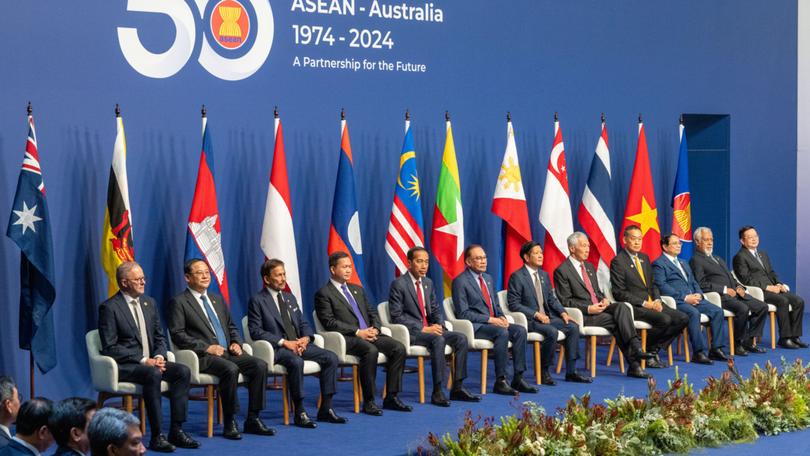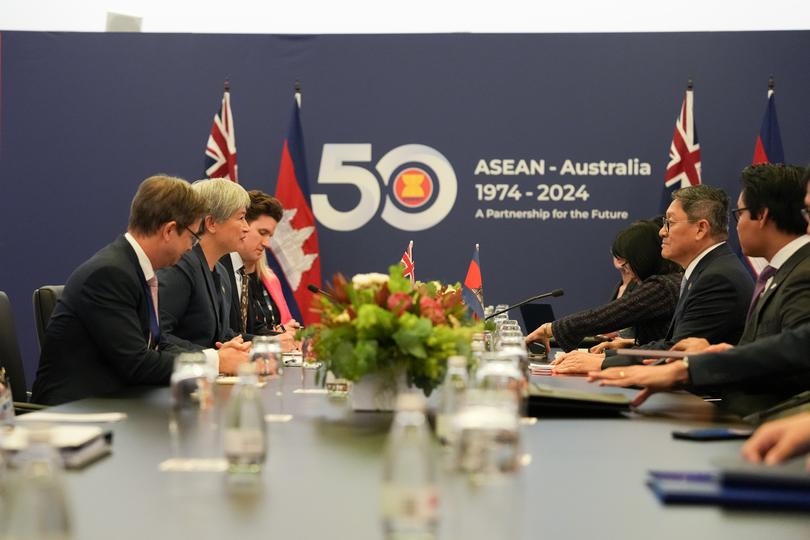Simon Birmingham: Dialogue and unity our best weapons in protecting regional stability
As China rapidly increases defence spending, Australia must speak plainly about the risks we see, the actions we are taking and the outcomes we seek.

Australia is fortunate. Unique as an island continent, we have enviable natural resources. We are home to the oldest continuously living cultures in the world. We enjoy the best of British systems of democracy and justice. Australia is also in the most dynamic region on the planet.
Dynamic: adjective; characterised by constant change, activity or progress. For most of my life our dynamic region has been changing for good. Hundreds of millions of people have been lifted out of poverty as Asia has grown exponentially, making Australians better off too.
This week, two meetings have shone different lights on our dynamic region.
Sign up to The Nightly's newsletters.
Get the first look at the digital newspaper, curated daily stories and breaking headlines delivered to your inbox.
By continuing you agree to our Terms and Privacy Policy.In Melbourne the leaders of all ASEAN nations except Myanmar gathered. The workings of the Association of South East Asian Nations aren’t exactly a barbeque stopper. But the ASEAN countries matter much more than most to Australia.
Between Broome and Darwin in our north, and Hainan or Hong Kong in China’s south, lie the ASEAN nations. Populous, diverse and ambitious, their decisions and their direction help to shape and define our own.

Further north, in Beijing, the National People’s Congress of China also met this week. While the votes cast at this meeting are predictable, the information shared offers some insights.
ASEAN nations have a population close to 700 million people, which is still growing. China has about 1.4 billion people, which is largely static. ASEAN GDP is around $5.7 trillion, while China’s is close to $27.7 trillion. ASEAN investment in Australia stands at around $183 billion, while China’s is $85 billion.
Of course, ASEAN doesn’t actually have a population, a GDP or its own outbound investment. It is the sum of its member nations, some with faster growing economies than China.
Melbourne’s meeting of ASEAN was a reminder of ASEAN unity, along with ASEAN differences. Co-operation between vastly different political systems, economies and cultures has ensured enduring peace between ASEAN nations.
All ASEAN nations want regional peace and stability, as a prerequisite for future growth and prosperity. So does Australia.
Some, like The Philippines, speak openly about threats to regional stability. Little wonder, given the frequency of aggression shown by Chinese government forces towards Filipino ships.
Others are more cautious in their public language, but none wishes to see their own sovereignty or rights undermined. Australia must use these occasions to speak plainly about the risks we see, the actions we are taking and the outcomes we seek.
In Beijing, official reports by the Chinese Government to the NPC revealed a boost to publicly declared defence spending of 7.2 per cent this year, yet again faster than China’s forecast economic growth. Under Xi Jinping known defence spending has more than doubled.
Xi’s government also omitted the word “peaceful” from its stated ambition for “reunification” with Taiwan, instead saying it intends to “be firm”.
These actions in Beijing should make us even more grateful for the discussions in Melbourne, and likely make ASEAN leaders more grateful too. Each of our efforts to uphold rules, create deterrence and secure peace assists the others.
In 2018 Malcolm Turnbull hosted the first Special Summit of ASEAN leaders in Australia. Anthony Albanese has been wise to follow suit, using the occasion of the 50th anniversary of Australia becoming ASEAN’s first dialogue partner as a hook.
Such diplomacy doesn’t in and of itself secure our region. But pursuing deeper economic two-way ties builds greater strength and resilience, from our supply chains to our balance sheets and even in our people-to-people understanding. Partnerships in domains like maritime co-operation, which were extended this week, build further support for international rule of law.
Dialogue builds understanding of our defence investments and alliances, including continued United States engagement in the region. Witness Singapore’s statement that Australian nuclear powered submarines will always be welcome in Singapore, or the quiet deepening of defence co-operation over many years between Australia and numerous ASEAN partners.
Australia must be dynamic in all the right ways, across government, business and society to advance our development, defence and diplomacy. ASEAN are our necessary partners in this. Together we can build frameworks of deterrence and dialogue that, we hope, can secure good fortune for us all.
Senator Simon Birmingham is the Shadow Minister for Foreign Affairs.
